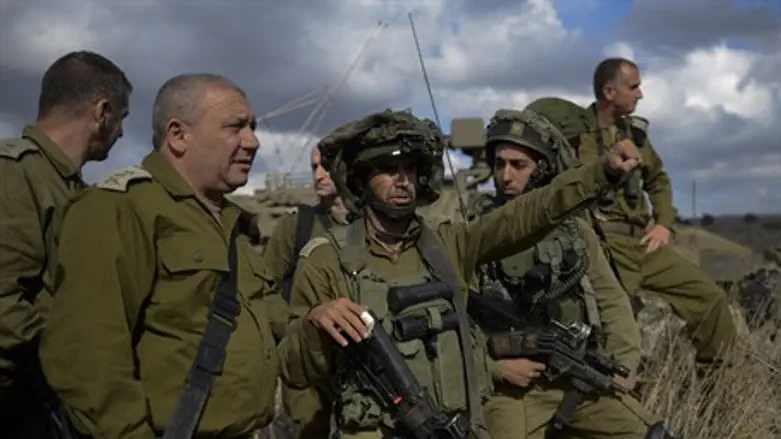
IDF Chief of Staff Lt. Gen. Gadi Eizenkot made a surprising statement on Wednesday morning during a visit to Bat Yam, in which he defended the army's controversial open-fire orders and brushed off the teachings of the Jewish sages.
During his visit to the city's cultural center which was attended by high school students, he said, "the phenomenon of terror accompanies Israeli society throughout the years, and there also were knifings years ago. It could be in Tel Aviv, in Otniel or Ariel. We see mutual influence between what happens in the Middle East with Daesh (ISIS) and what happens for us here (in Israel)."
One of the high school students asked Eizenkot whether he intends to change the opening fire procedures, arguing that the current orders endanger the lives of IDF soldiers and are stricter than ever.
Last August the orders were made even tighter, mandating soldiers in Judea and Samaria to only fire in the air, and not even shoot the lower extremities of an attacker other than in extreme cases of imminent life-threatening danger. In May, it was reported that IDF soldiers were told to avoid killing terrorists, even if they spot them as they are about to throw a potentially lethal firebomb or rock at a car.
But Eizenkot argued the orders don't need changing on Wednesday, and went on to disparage a famous Talmudic maxim on self-defense.
"The IDF cannot speak in slogans like 'when someone comes to kill you – kill him first,'" he said, citing the dictum. Eizenkot also dismissed as a "slogan" the following: "everyone holding scissors must be killed." Arab terrorists have conducted numerous lethal stabbings with scissors during the recent wave of attacks.
The Talmudic dictum was recently quoted by Chief Sephardic Rabbi Yitzhak Yosef last October, when he praised soldiers who kill attacking terrorists and lauded them for performing a mitzvah.
A week earlier senior Sephardic Rabbi Meir Mazuz urged Israeli bystanders to kill terrorist attackers rather than capture them alive, and Tzfat (Safed) Chief Rabbi Shmuel Eliyahu likewise warned not to let terrorists "survive their attacks," to prevent their ability to be freed and return to attack again.
The need to dispatch attacking terrorists as soon as possible has been illustrated on numerous occasions, including in one harrowing attack in Hevron last December, when an Arab terrorist repeatedly stabbed an IDF soldier on the ground even after being shot multiple times.
"Over 40,000 PA security members"
In his visit on Wednesday, Eizenkot also spoke about the security cooperation with the Palestinian Authority (PA).
"There is cooperation with the Palestinian security mechanisms, there are 40,000 security personnel of this sort," he said, noting the large number of PA forces who were established and armed by Israel in the 1994 Oslo Accords.
A growing number of the terrorists in recent attacks have proven to be PA policemen, in a disturbing trend that is being openly promoted by sources such as Hamas.
Following the 2000 Second Intifada or Oslo War, in which over 1,000 Israelis were murdered, PA officials later bragged that 70% of the attacks were conducted by PA Security Force members.
The IDF Chief of Staff also spoke about the threats by Hezbollah terror chief Hassan Nasrallh on Tuesday night, in which he threatened to hit Haifa's ammonia tank with a missile.
"Hezbollah is the central enemy, we meet Hassan Nasrallah once a week on the TV," said Eizenkot, addressing the Iran-proxy Lebanese terror group.
"Hezbollah is building all of its abilities in a rural environment, so as to develop a strategic balance against the state of Israel," he said, noting the terror infrastructure in Lebanese villages. "At the same time, the IDF is succeeding in exercising deterrence. In the last decade the Lebanese border has been a quiet front."